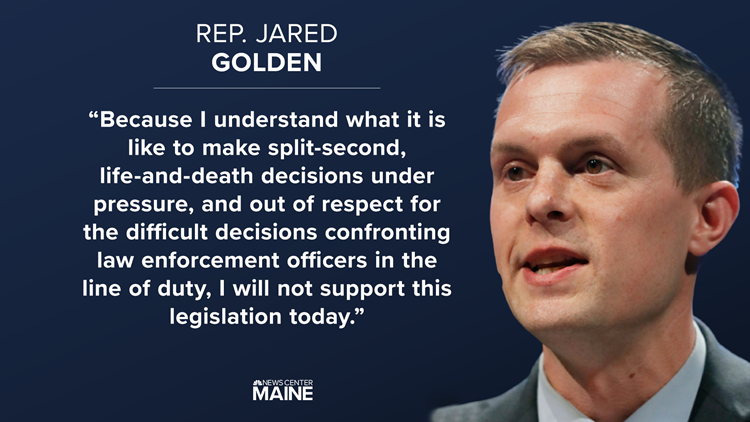WASHINGTON, D.C., USA — In another break with his party, Maine Democratic Rep. Jared Golden voted against the sweeping police reform bill Wednesday night. Despite his opposition, the bill, named the George Floyd Justice in Policing Act, passed in a 220-212 vote.
Democratic Rep. Ron Kind of Wisconsin also voted against the bill.
The legislation, which was first approved last summer but stalled in the Senate, was named in honor of Floyd, whose killing by police in Minnesota last Memorial Day sparked protests nationwide. The bill would ban chokeholds and “qualified immunity” for law enforcement, and create national standards for policing in a bid to bolster accountability.
In a statement Wednesday night following the vote, Golden said the bill "includes many good provisions that would bring about positive change," noting the establishment of a national registry for police misconduct, increased data-collection, encouragement of de-escalation tactics, and banning chokeholds unless deadly force is authorized.
He said last summer after the House first attempted to pass the bill that he "argued that we were at an inflection point and that the House and the Senate needed to set aside partisan differences and come together to meet the moment to deliver on demands for reform."
While Democrats used their majority to pass the police reform measure in the House last summer, it stalled in the the Senate, which was at the time controlled by Republicans. GOP senators pushed an alternate plan that Democrats blocked from consideration, calling it inadequate.
"My vote for the bill at the time reflected my sincere desire to move forward with negotiations, even though I held significant concerns about how the House bill eliminated qualified immunity protections for law enforcement officers," Golden said.
“Unfortunately, there have been no negotiations since the legislation’s first passage, and the bill before us retains those same problematic changes," Golden continued. "Because I understand what it is like to make split-second, life-and-death decisions under pressure, and out of respect for the difficult decisions confronting law enforcement officers in the line of duty, I will not support this legislation today."
[Read Golden's full statement below.]
Maine's other Democratic Rep. Chellie Pingree, however, voted for the bill, and said in a statement the bill "is [a] critical step to rein in future abuses."
“This legislation will finally stop the barbaric use of chokeholds and end no-knock warrants, ensuring our nation has uniform standards for policing and the tools to hold bad actors accountable," Pingree said.
Democrats now control both chambers of Congress, but it seems unlikely the bill could pass the Senate without substantial changes to win GOP support.
Golden's full statement:
"Every American should be treated equally before the law, regardless of race, gender, economic status, or any other factor. Our country needs to reckon with the racism and inequality which have persisted for far too long. And there must be accountability for gross negligence in the use of force by a law enforcement officer like what took place in Minneapolis with the killing of George Floyd.
The bill before us today includes many good provisions that would bring about positive change. Among the most significant are the establishment of a national registry for police misconduct and increased data-gathering to help inform oversight and encourage a sustained commitment to progress. I support many other provisions in the bill -- such as the encouragement of de-escalation tactics, banning chokeholds unless deadly force is authorized, collecting data on the use of force, ensuring outside review in all deadly force cases, and conducting anti-bias training -- policies that have long been in use at the Maine Criminal Justice Academy, the single clearinghouse in our state for certification as a police officer.
Last summer, following the first attempt to pass this legislation, I argued that we were at an inflection point and that the House and the Senate needed to set aside partisan differences and come together to meet the moment to deliver on demands for reform. My vote for the bill at the time reflected my sincere desire to move forward with negotiations, even though I held significant concerns about how the House bill eliminated qualified immunity protections for law enforcement officers.
Unfortunately, there have been no negotiations since the legislation’s first passage, and the bill before us retains those same problematic changes. Because I understand what it is like to make split second, life-and-death decisions under pressure, and out of respect for the difficult decisions confronting law enforcement officers in the line of duty, I will not support this legislation today.
Eliminating qualified immunity for law enforcement officers could result in unintended consequences for both individual law enforcement officers and the profession as a whole. Even so, there is room for lawmakers to clarify the intent of Section 1983 to ensure that American citizens’ rights are safeguarded while still ensuring law enforcement officers retain appropriate protections while on the job.
While I am concerned about eliminating qualified immunity entirely, I do believe there are reasonable criticisms about how the courts have interpreted the doctrine, and given its evolution in recent years, I believe that lawmakers or the Supreme Court may need to take another look at it. For example, I believe that the Court overreached in Pearson v. Callahan (2009), ruling that courts have discretion to focus only on whether the conduct in question was a ‘clearly established’ violation of law without first considering if an individual’s rights had been violated. In the years that have followed the Pearson decision, there is evidence that plaintiffs in excessive force cases have had a more difficult time getting past qualified immunity.
In the past year, I have heard from Mainers across my district on these issues, including many law enforcement officers, who have all expressed support for lawful protests against racism. Law enforcement officers have spoken passionately about their commitment to protecting their communities, and they are open to new policies that could bring about improvements to how they do the job. With that in mind, there was a lot of room for agreement between the House and Senate bills last summer, and that still remains true today. That is why we should not let the failures of the last Congress lead us down the same path again. The nation needs to see that Congress can work together on difficult issues to deliver results. I hope the action the House takes today does not mark the end of the conversation, but instead can spur a renewed effort to find necessary compromise and get something positive done for the American people.”
Pingree's full statement:
“The vast majority of police do their jobs honorably and put themselves in harm’s way to keep us safe. But we cannot overlook egregious cases of police misconduct and our country’s long history of racial profiling and mistreatment of Black Americans by law enforcement. After our nation witnessed the murder of George Floyd, there was prolonged outcry for police accountability and real reforms to curb police brutality. While there’s no single bill that will erase generations of racial profiling or excessive force toward Black Americans, the Justice in Policing Act is critical step to rein in future abuses. This legislation will finally stop the barbaric use of chokeholds and end no-knock warrants, ensuring our nation has uniform standards for policing and the tools to hold bad actors accountable.”



